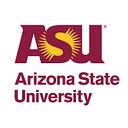5 ways ASU is fighting plastics pollution
This Earth Day, take a look at just some of the ways Arizona State University researchers and students are working to #BeatPlasticPollution.
ASU developing biodegradable plastics made from bacteria
The world is awash in discarded plastics. A recent estimate of the amount of plastic in Earth’s environment puts it at 6.3 billion metric tons (of the 8.3 billion metric tons that have been mass produced since the 1950s). This includes what is in landfills and what floats around in our rivers, lakes and oceans. Some plastics can take up to 400 years to degrade.
What can be done to change this situation? ASU Assistant Professor Taylor Weiss says one way would be to make 100 percent biodegradable bioplastics using bacteria — specifically cyanobacteria, a photosynthesis-happy bug, as one of the starting materials — that would dissolve in the environment in a matter of months.
Weiss recently joined ASU’s Polytechnic campus, where he will work on scaling up the process at the Arizona Center for Algae Technology and Innovation (AzCATI).
Solar-powered fishing lights are a biologist’s bright idea to save the oceans from plastic trash
“This is the future of fisheries,” said Jesse Senko, a biologist at Arizona State University’s School for the Future of Innovation in Society. “Around the world, they are going to be fishing with solar-powered nets and solar-powered longlines. With a solar-powered light, you don’t do anything. You’re out on the ocean — you have a ton of sunlight, and it’s free.”
It would also contribute toward the marketability of catch. Everywhere from coastal restaurants to mega chains like Target, McDonald’s and Whole Foods tout “sustainably caught” seafood because consumers want it. Fishing gear that doesn’t add to marine trash and helps prevent endangered bycatch helps earn that label.
Read more: Q&A: How do microplastics affect the planet?
Senko is partnering with ASU’s Solar Power Laboratory and NOAA Fisheries to develop miniaturized solar-powered lights on longlines and nets to replace the plastic glow sticks that fishermen now use to attract fish to bait, which are then tossed overboard when the catch is hauled in.
A happy side benefit? Turtles and sharks can better see the nets and avoid them.
ASU student spearheads lab-glove recycling program
Starting this fall 2018, lab gloves will begin to be recycled at ASU. It’s the work of an undergrad putting his education to use before graduation.
Junkee Justin Ahn, 23, is a junior majoring in sustainability. Interning at paper giant Kimberly Clark, Ahn noticed they have a nitrile glove recycling program. Ahn thought of all the labs at ASU’s campuses and had an idea.
As the glove-recycling program — called RightCycle — spreads to other labs and campuses, Ahn expects more than 20,000 gloves to be recycled per week.
The used gloves are sent to recycling centers. They’ll be processed into plastic pellets or nitrile powder, which can then be used to manufacture anything plastic.
“A small input like this bin can make a huge difference,” he said.
The School of Molecular Sciences, Environmental Health and Safety, lab manager Beatriz Smith and lab safety program manager John Crozier were involved in the recycling program.
ASU sustainability students work to keep the green in spring-training baseball
A class from the School of Sustainability at Arizona State University is working with the MLB to make spring training greener, to not only divert some of that garbage to be recycled, but also to engage with fans about sustainability in a way that’s positive and helpful, according to Colin Tetreault, a faculty associate in the school and a senior sustainability scholar in the Julie Ann Wrigley Global Institute of Sustainability.
The zero-waste project is a first-of-its-kind partnership among ASU, the Arizona Diamondbacks, the Colorado Rockies and Salt River Fields at Talking Stick, the spring-training facility that is owned by the Salt River Pima Maricopa Indian Community and shared by the two teams in March.
Senior Tyler Morningstar, who’s in the spring-training class, has been to most of the games and also has an internship with the stadium this semester. He’s been involved with outreach for the project, doing interviews and appearing on the giant scoreboard to talk about the Recycle Rally.
“Informing people has been one of the most important parts of the process,” he said. “A lot of people want to recycle but they get confused along the way.”
RISN Incubator drives vibrant circular economy
The RISN Incubator assists aspiring new ventures that focus on waste diversion and improvements in processing or utilization of waste as a raw material for new products or energy in the early stages of development.
Selected startups receive unique access to resources and support from ASU — named the most innovative school in the nation by U.S. News and World Report for three straight years — and Phoenix — named the Top Performing City overall by Governing and Living Cities — to develop solutions that contribute to the regional circular economy.
One startup concept within the original cohort included:
- Renewlogy, developer of a proprietary chemical recycling process that allows plastic to be reversed back into its basic molecular structure, converting nonrecycled plastic waste into new valuable products such as high-value fuels. Renewlogy was a winner of the 2017 Arizona Innovation Open.
Find out more
Q&A: An ASU expert on new revelations about the scope of the Great Pacific Garbage Patch and what it means.
